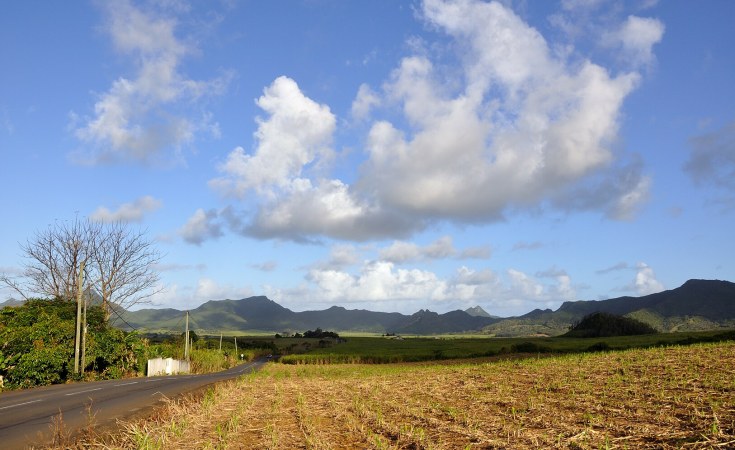Mauritius' heavy dependence on food imports makes it vulnerable to global commodity and supply disruptions, but collaborative sustainable interventions are making a difference
This is a particularly interesting time to be the Resident Co-ordinator for a small island state like Mauritius. Since my arrival in the country in 2022, I have experienced the impact of extreme weather conditions such as flooding and cyclones, as well as water shortages.
These visible effects of climate change, combined with our geographical remoteness, limited economies of scale and high cost of import have grave consequences for our island's food security. The escalating high import cost is amplified by the COVID-19 pandemic and the Ukraine war.
Consequently, ensuring food security is a growing concern in our sustainable economic transformation agenda.
Robust food systems have emerged as more than just an agricultural challenge; they could potentially be a catalyst for achieving multiple Sustainable Development Goals (SDGs).
The upcoming UN Food Systems Stocktaking Moment taking place in Rome, Italy, from July 24-26, 2023, provides an opportunity for Mauritius and other participating countries to focus on accelerating the transformative power of food systems.
Food production is interconnected with other sectors. While water and energy are direct inputs at all stages of the food value chain, natural resources, ecosystems, and their services underpin the security of these inputs.
Agriculture accounts for 30 per cent of water use in Mauritius.
Globally, one-third of the world's available energy is consumed by the food production value chain.
Addressing water scarcity and investing in renewable energy is critical to food security.
Mauritius imports three-quarters of its energy (oil), with renewable energy accounting for 24 percent of its current energy mix. It imports over 77 percent of its food requirements, with rising prices of staple foods such as bread, black lentils, powdered milk and cooking oil straining households.
This heavy reliance on imports, including seeds, fertilisers, pesticides, technology, and equipment, makes Mauritius vulnerable to disruptions in global commodity and supply chains.
Transforming food systems can play a key role in countries' mitigation and adaptation strategies. For instance, in line with its Nationally Determined Contributions, Mauritius has reaffirmed its commitment to reducing Green House Gas emissions from the agricultural sector.
It has also identified agriculture as a priority sector for climate change adaptation, with a focus on efficient irrigation techniques and climate-smart agriculture practices.
UN in Mauritius
For the UN team in Mauritius, supporting a holistic approach to addressing the interconnected challenges of food, climate, water, energy, and gender is critical.
We focus on two key areas:
- The first is the upstream policy and institutional engagement to inform the strategies, policies, and budgets necessary to transform food systems.
- The second is the downstream community resilience, leveraging the power of partnership, digital platforms, private-public modalities, and data, with women and youth at the center of our efforts to ensure inclusivity.
For countries like Mauritius, where tourism is a significant source of GDP earnings, the impact of climate change poses a sustainability risk given its rare but fragile natural ecosystems. Lives and livelihoods of communities, particularly in coastal areas, are directly impacted. Coral bleaching and human pollution are putting pressure on the lagoon ecosystems, affecting artisanal fishers like Nazma and her family.
Nazma has been engaged in artisanal fishing for over 30 years, alongside her husband and many of her children. Artisanal fishing is considered a sustainable way of fishing as it relies on the use of lines, unlike commercial fishing where trawling is preferred.
Furthermore, most of the fish caught by Nazma's family are for consumption in Mauritius, rather than for export.
Nazma explains her love for fishing this way: "It is my passion that has become my livelihood," adding, "But life is expensive, fuel is expensive, and there are fewer fishes in the lagoon these days."
In collaboration with the European Union through its Ecofish project, the UN is using technological innovations to empower artisanal fishers to move out of over-exploited lagoons.
By improving the economic resilience of these traditional fishing communities, food security will be strengthened through better-managed marine resources.
In Rodrigues, an island east of Mauritius, we are working with a group of eight women who have established the Rodrigues Turmeric Producers Association to grow and process turmeric into powder for commercial purposes.
In addressing the energy requirements of their agricultural practices, Marie-Anne, a member of the association, says that with a grant from the Global Environment Facility of the Small Grant Programme (GEF-SGP), they were able to acquire a solar dryer.
Prior to this, she says, "We had an electric dryer that consumed a lot of energy and cost us a lot of money."
Perrine, a colleague and friend of Marie-Anne, explains that the business "allows women to emancipate themselves, and our grandchildren will in turn be able to continue this work because turmeric will always be there."
Besides the UNDP-implemented SGP projects, other innovative sustainable food systems solutions being piloted by the UN family--UNDP, FAO and UN Women--under the joint SDG Fund include the use of seaweed to produce, locally, low-cost biofertilisers.
Furthermore, there are initiatives to nurture smart agriculture, supported by FAO, UNDP, UNCTAD and UNFPA. To address financing challenges, the UNDP-supported SDG Investor Map identifies investment opportunities for the private sector in priority areas for development, with around 70 percent of these areas directly or indirectly linked to food systems.
With only seven years left to achieve Agenda 2030, the UN Country Team in Mauritius will continue its support for the diversification of the economy, strengthening the circular economy, and investing in human capital to combat supply shocks.
Collaborative efforts will be key to furthering climate action and fostering resilient pathways that will protect the future of Mauritius. This collective endeavour will ensure the well-being of its people and planet and promote prosperity.
Lisa Singh is the UN Resident Coordinator in Mauritius


